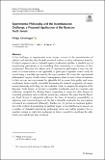Files in this item
Experimental philosophy and the incentivisation challenge : a proposed application of the Bayesian Truth Serum
Item metadata
| dc.contributor.author | Schönegger, Philipp | |
| dc.date.accessioned | 2021-08-16T16:30:04Z | |
| dc.date.available | 2021-08-16T16:30:04Z | |
| dc.date.issued | 2021-08-14 | |
| dc.identifier | 275040553 | |
| dc.identifier | 8c8c4f11-1ba4-4eba-bc54-e28fad79976f | |
| dc.identifier | 000684907900002 | |
| dc.identifier | 85112544434 | |
| dc.identifier.citation | Schönegger , P 2021 , ' Experimental philosophy and the incentivisation challenge : a proposed application of the Bayesian Truth Serum ' , Review of Philosophy and Psychology , vol. First Online . https://doi.org/10.1007/s13164-021-00571-4 | en |
| dc.identifier.issn | 1878-5158 | |
| dc.identifier.other | ORCID: /0000-0001-9930-487X/work/98785791 | |
| dc.identifier.uri | https://hdl.handle.net/10023/23782 | |
| dc.description.abstract | A key challenge in experimental social science research is the incentivisation of subjects such that they take the tasks presented to them seriously and answer honestly. If subject responses can be evaluated against an objective baseline, a standard way of incentivising participants is by rewarding them monetarily as a function of their performance. However, the subject area of experimental philosophy is such that this mode of incentivisation is not applicable as participant responses cannot easily be scored along a true-false spectrum by the experimenters. We claim that experimental philosophers’ neglect of and claims of unimportance about incentivisation mechanisms in their surveys and experiments has plausibly led to poorer data quality and worse conclusions drawn overall, potentially threatening the research programme of experimental philosophy in the long run. As a solution to this, we propose the adoption of the Bayesian Truth Serum, an incentive-compatible mechanism used in economics and marketing, designed for eliciting honest responding in subjective data designs by rewarding participant answers that are surprisingly common. We argue that the Bayesian Truth Serum (i) adequately addresses the issue of incentive compatibility in subjective data research designs and (ii) that it should be applied to the vast majority of research in experimental philosophy. Further, we (iii) provide an empirical application of the method, demonstrating its qualified impact on the distribution of answers on a number of standard experimental philosophy items and outline guidance for researchers aiming to apply this mechanism in future research by specifying the additional costs and design steps involved. | |
| dc.format.extent | 26 | |
| dc.format.extent | 798204 | |
| dc.language.iso | eng | |
| dc.relation.ispartof | Review of Philosophy and Psychology | en |
| dc.subject | B Philosophy (General) | en |
| dc.subject | NDAS | en |
| dc.subject | NIS | en |
| dc.subject.lcc | B1 | en |
| dc.title | Experimental philosophy and the incentivisation challenge : a proposed application of the Bayesian Truth Serum | en |
| dc.type | Journal article | en |
| dc.contributor.institution | University of St Andrews. Philosophy | en |
| dc.identifier.doi | https://doi.org/10.1007/s13164-021-00571-4 | |
| dc.description.status | Peer reviewed | en |
This item appears in the following Collection(s)
Items in the St Andrews Research Repository are protected by copyright, with all rights reserved, unless otherwise indicated.

